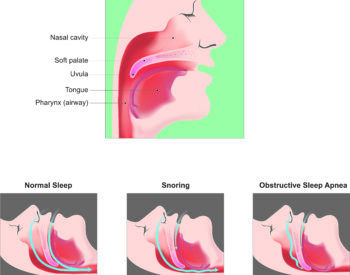|
Not only can snoring be an issue for a sleep partner, it can also represent a health problem for a patient if it is associated with sleep disordered breathing including sleep apnea. In the case of sleep disordered breathing, snoring may be a sign of mild to moderate obstructive sleep apnea. This can result in:
What are some of the causes of snoring?First, there are nasal causes of snoring. These include nasal obstruction such as a deviated nasal septum, enlarged nasal turbinates, nasal polyps, and chronic sinusitis. The second category of conditions that can cause snoring is a partial obstruction in the pharynx or throat. These include enlarged tonsils, excessive soft palatal tissue, as well as a tongue position that partially occludes the throat while sleeping. Finally, there are systemic causes of snoring that include being overweight, drinking or eating close to bedtime, and excessive fatigue and tiredness. A full upper airway examination can help determine the causes of snoring for particular individual. If sleep-disordered breathing is suspected, a sleep study may help in determining the severity of the problem. Depending on the results of the physical examination, possible imaging studies and a sleep study may be ordered. A referral to a sleep specialist to discuss treatment options that are tailored to the patient’s particular cause of snoring may also be recommended. |
Schedule A Consultation
How Can We Help?
* All indicated fields must be completed.
